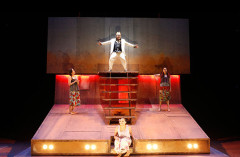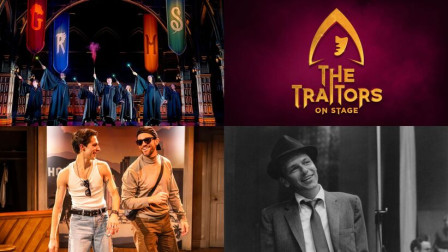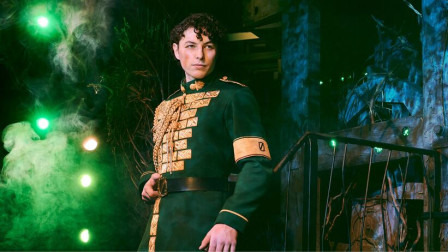Review: THE SHADOW KING at the Barbican
 Transposing the story of King Lear to Australia, Shadow King presents a Lear as the leader of an indigenous community based in the Northern Territory of Australia. Tommy E Lewis’s King Lear is a cheeky child-like, Del Boy figure who chooses to divide his land among his three daughters, with the amount that they are each to receive based upon how well they answer Lear’s question: “How much do you love me?”. Two out of three (Goneril and Regan) give splendidly sycophantic and deceitful answers whilst Cordelia - shocked by her father’s actions - refuses to participate. Subsequently, Lear banishes Cordelia for her lack of love setting in motion a series of events that lead to family feuding, territorial jealousy and we’re off on our tragic way.
Transposing the story of King Lear to Australia, Shadow King presents a Lear as the leader of an indigenous community based in the Northern Territory of Australia. Tommy E Lewis’s King Lear is a cheeky child-like, Del Boy figure who chooses to divide his land among his three daughters, with the amount that they are each to receive based upon how well they answer Lear’s question: “How much do you love me?”. Two out of three (Goneril and Regan) give splendidly sycophantic and deceitful answers whilst Cordelia - shocked by her father’s actions - refuses to participate. Subsequently, Lear banishes Cordelia for her lack of love setting in motion a series of events that lead to family feuding, territorial jealousy and we’re off on our tragic way.
The location of the piece and the discussion of land is ever-present within gorgeous, epic landscaped projections of the outback and an on-stage band provide funk-rock tunes and authentic indigenous music, which add to the overall atmosphere and urgency of the piece. But, the great achievement of this production is its use of language. Bravely, only fragments of the original text are used and those that make the trip are mixed with contemporary English and Kriol into a multi-lingual script. The multiplicity of the language is an utter delight, and the delightful Fool (Kamachi Djordon King) is exceptionally agile at handling it. His intention behind each line was clear and concise, his stage prescience was magnetic and, when directly engaging the audience, comfortable and at ease. His performance began brilliantly in a nonchalant and comedic prologue, before becoming the finest performance in the production.
However, The Shadow King felt too short for me - too short to fully explore a complex story, too short to truly explore this adaptation and the richness in design and content it brings with it. The room for character development felt rushed, and moments of stillness, which would have been gorgeous respites within a larger production, slowed the action down. This was most notable in Lewis’ Lear who brought an original vivaciousness and an infectious carefree attitude. However, his hastened descent into madness showed the silliness without the thoughtfulness, the liveliness without the grief-stricken moment of revelation and moreover I didn't have enough of an opportunity to really emphasise with his overall situation.
I do hope this production is reproduced again in a longer format. It’s one of those rare Shakespeare-adaptations that doesn’t feel like it’s simply accommodating the source material but augmenting it. With that in mind, I think a great deal of this potential expansion could be achieved by simply exploring more of the original text within the landscape of the outback.
This is special work and I hope to see a more substantial version of it in the future.
Latest News

 Review: AMERICAN PSYCHO at Almeida
1 February 2026 at 23:59
Review: AMERICAN PSYCHO at Almeida
1 February 2026 at 23:59

 This Month in the West End (January 2026)
30 January 2026 at 17:36
This Month in the West End (January 2026)
30 January 2026 at 17:36

 Casting update revealed for West End production of WICKED
30 January 2026 at 14:27
Casting update revealed for West End production of WICKED
30 January 2026 at 14:27

 Full cast announced for David Hare's TEETH 'N' SMILES at Duke of York's Theatre
30 January 2026 at 11:02
Full cast announced for David Hare's TEETH 'N' SMILES at Duke of York's Theatre
30 January 2026 at 11:02
